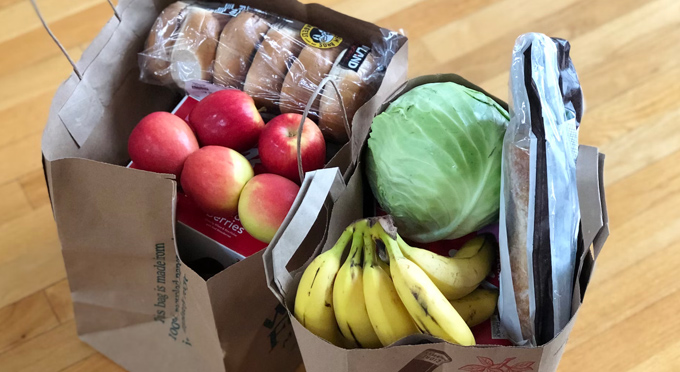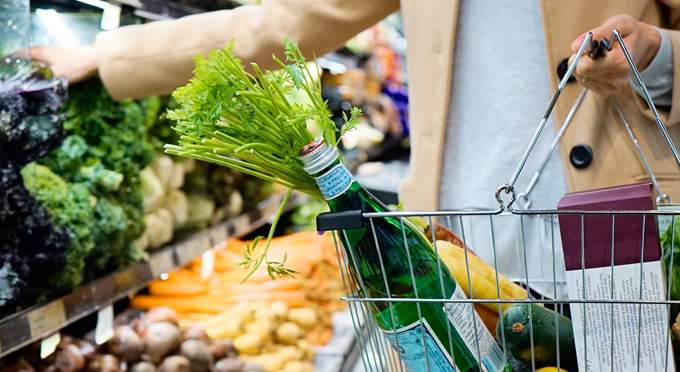
If you could, you’d probably eat all organic all the time. You’d fill your cart with organic produce, pasta and pet foods and cram your cupboards with organic coffee and cookies. You know they’re better for you, the environment and local farmers. Problem is, all that tasty goodness comes at a price. Organic fare still costs more–sometimes a lot more–than the mainstream stuff. The good news is that with the growth of the organics industry, prices are becoming more competitive even as variety increases.
Eating organic doesn’t have to break the bank. While organic products can be pricier than conventional alternatives, there are savvy ways to incorporate organic foods into your diet without draining your wallet. Here are five strategies to help you enjoy the benefits of organic eating while staying on budget:
1. Prioritize Organic for the “Dirty Dozen”
The Environmental Working Group (EWG) publishes an annual list of the “Dirty Dozen,” which includes produce items most likely to contain pesticide residues. Prioritize buying organic for these items, including strawberries, spinach, and apples, to reduce your pesticide exposure while still staying within budget. For items not on the list, conventional versions may be a more economical choice.
The “Dirty Dozen” is a term coined by the Environmental Working Group (EWG), a non-profit organization that analyzes pesticide residue data in produce. The list comprises fruits and vegetables that tend to have the highest levels of pesticide residues when conventionally grown. The EWG updates this list annually to inform consumers about which produce items are best to buy organically. Here are some additional details about the “Dirty Dozen”:
- Changing List: The composition of the “Dirty Dozen” may vary from year to year, depending on the pesticide residue data available. Some items, like strawberries, apples, and spinach, have been consistent members of the list due to their susceptibility to pesticides.
- Reasons for Inclusion: Produce on the list is included due to its high pesticide contamination levels when conventionally grown. This contamination can pose health risks when consumed regularly. Pesticides are used in conventional agriculture to ward off pests and diseases but can also leave behind residues on the produce.
- Organic Alternatives: The “Dirty Dozen” highlights the importance of choosing organic options for these items to reduce pesticide exposure. Organic farming relies on natural and sustainable practices, avoiding synthetic pesticides, making these products a safer choice.
- Wash Thoroughly: Even when buying organic, it’s a good practice to wash all fruits and vegetables before consumption. This helps remove any potential surface residues and dirt.
- Know Your Source: Consider purchasing these items from local farmers’ markets, where you can inquire about their growing practices. Many small-scale and local growers may follow organic or low-pesticide methods even if they aren’t certified.
- Health Benefits: Choosing organic for the “Dirty Dozen” items can contribute to a healthier diet by reducing your exposure to potentially harmful pesticides. While organic produce may be slightly more expensive, many people find the health benefits well worth the cost.
By staying informed about the “Dirty Dozen” and making thoughtful choices in your produce shopping, you can enjoy the benefits of organic eating while protecting your health and supporting sustainable farming practices.
2. Buy in Bulk
Organic products can often be found at a lower cost when purchased in bulk. Consider buying organic staples like grains, beans, and legumes in larger quantities. This not only saves money but also reduces packaging waste.
Buying organic foods in bulk can be a practical and cost-effective way to incorporate more organic items into your diet while also reducing waste. Here are some additional details about buying organic foods in bulk:
- Cost Savings: Purchasing organic foods in bulk often results in significant cost savings per unit. Many bulk bins in stores allow you to buy only the amount you need, reducing overall expenses.
- Reduced Packaging: Buying in bulk reduces the need for excess packaging. This is an eco-friendly choice that minimizes plastic waste and contributes to a more sustainable lifestyle.
- Fresher Ingredients: When you buy in smaller quantities, especially when it comes to perishable organic items like grains, nuts, or dried fruits, you may enjoy fresher ingredients as you can use them before they go stale.
- Customizable Portions: Bulk bins typically allow you to select the quantity you want, which is especially useful if you’re experimenting with a new ingredient or want to control your portion sizes.
- Less Food Waste: By buying only what you need, you can reduce food waste in your home. This is not only economically wise but also an environmentally friendly practice.
- Storage Considerations: When buying in bulk, ensure you have appropriate storage containers to keep your organic foods fresh. Airtight containers are a great choice for grains, nuts, and other dry goods.
- Variety and Flexibility: Buying in bulk gives you the flexibility to try a wide range of organic foods, from pantry staples to unique and specialty items. It allows you to experiment with your diet while staying within your budget.
- Local Options: Some local co-ops or specialty stores offer organic bulk sections with items like grains, beans, nuts, and more. Supporting local stores can be a way to invest in your community and reduce your carbon footprint.
- Quality Assurance: Check the quality of the bulk bins and their cleanliness. A reputable store will maintain its bulk sections well to ensure the integrity of the products.
- Evaluating Price and Quality: While bulk items are often more affordable, assess the price per unit, and compare it to pre-packaged organic options to ensure you’re getting a good deal. Additionally, check for product quality by looking at the freshness and appearance of the bulk items.
Buying organic foods in bulk can be a smart and eco-conscious choice, benefiting both your budget and the environment. It’s a sustainable approach that aligns with the principles of organic and eco-friendly living.
3. Join a Community Supported Agriculture (CSA) Program
CSA programs connect consumers directly with local organic farms. By becoming a member, you can receive a regular supply of fresh, seasonal, and often cost-effective organic produce. This supports local farmers while allowing you to enjoy affordable organic foods.
Community Supported Agriculture (CSA) programs are an excellent way to access fresh, locally grown organic produce and support local farmers. Here are some additional insights into CSA programs:
- Variety of Products: CSA shares typically offer a variety of organic products, including fruits, vegetables, herbs, and sometimes even eggs, meat, or dairy. The variety depends on the farm’s offerings.
- Regular Deliveries: Subscribers usually receive a regular supply of fresh, seasonal produce. This encourages consumers to incorporate more organic foods into their diets and experiment with new ingredients.
- Supporting Local Farmers: CSA programs are an essential source of income for local farmers, helping them sustain their operations and continue to provide organic, sustainably grown foods.
- Farm Transparency: Many CSA programs emphasize transparency in farming practices, allowing members to visit the farm, learn about their growing methods, and gain a deeper understanding of where their food comes from.
- Community Connection: Joining a CSA often fosters a sense of community among members. Many CSA farms host events, workshops, and gatherings that allow subscribers to meet and connect with their fellow shareholders.
- Learning Opportunities: CSA memberships often come with educational resources, such as newsletters, recipe suggestions, and cooking tips to help subscribers make the most of their organic produce.
- Customization: Some CSA programs offer flexibility in choosing the contents of your share, allowing you to tailor it to your preferences or dietary restrictions.
- Environmental Benefits: By choosing local, organic products from a CSA, you reduce the carbon footprint associated with your food. Transportation distances are shorter, and many CSA farms prioritize sustainable farming practices.
- Growing Season: CSA shares align with the growing season of your region. This means you’ll receive the freshest produce when it’s at its peak, which can enhance the flavor and nutritional value of your meals.
- Payment Options: CSA programs typically offer various payment plans to accommodate different budgets. You can choose the option that works best for you, whether it’s a one-time lump sum, monthly payments, or other arrangements.
- Challenges: CSA programs may not suit everyone, as they require a degree of commitment and flexibility in adapting to seasonal availability. Some subscribers might receive produce they are less familiar with and need to find creative ways to use.
- Location-Dependent: Availability and types of CSA programs vary by location, so not everyone may have access to one. It’s essential to research local CSA options to find one that suits your needs.
Community Supported Agriculture is a sustainable and organic food model that connects consumers directly with local farmers, promoting a sense of community and encouraging healthy, locally sourced eating. Joining a CSA can be a rewarding experience for individuals looking to incorporate more organic produce into their diets while supporting local agriculture.

4. Shop Seasonally
Seasonal fruits and vegetables are typically more abundant and affordable. Explore your local farmers’ markets or grocery stores and focus on in-season organic produce. You can freeze or can surplus items to enjoy them throughout the year.
Shopping seasonally is a key aspect of buying organic on a budget. Here’s more about the benefits and strategies for shopping seasonally:
Benefits of Shopping Seasonally
- Cost-Effective: Seasonal produce is often abundant, which leads to lower prices. This means you can enjoy fresh, organic fruits and vegetables without breaking the bank.
- Optimal Flavor: When you purchase in-season produce, you’re getting fruits and vegetables at their peak in terms of flavor and nutrition. They tend to taste better, making your meals more enjoyable.
- Nutritional Value: Seasonal foods are typically harvested at their ripest, so they are packed with essential nutrients. This ensures that you’re getting the most nutritional benefit from your organic produce.
- Support Local Agriculture: Seasonal shopping encourages you to support local farmers and markets. It’s a great way to invest in your community’s agriculture and reduce the carbon footprint of your food.
Strategies for Shopping Seasonally
- Farmer’s Markets: Visit local farmer’s markets, where you can find a variety of fresh, seasonal organic produce. These markets often offer lower prices than supermarkets and provide a direct connection to local farmers.
- Join a CSA: As previously mentioned, Community Supported Agriculture programs provide subscribers with seasonal produce that’s directly sourced from local farms. It’s an excellent way to access seasonal organic fruits and vegetables.
- Know Your Region: Understand what’s in season in your region. You can use online resources or consult with local farmers to get an idea of what’s currently available. Different regions may have varying seasons for specific produce.
- Preserve the Harvest: When seasonal produce is abundant and affordable, consider preserving it for later use. Methods like canning, freezing, or dehydrating can help you enjoy seasonal flavors throughout the year.
- Plan Meals Accordingly: Plan your meals around what’s in season. Incorporate seasonal ingredients into your recipes to take advantage of their affordability and flavor.
- Buy in Bulk: When you find a good deal on seasonal produce, consider buying in bulk and storing it for future use. Be sure to use proper storage techniques to maintain freshness.
- Stay Flexible: Be open to trying new recipes and ingredients based on what’s in season. This can lead to culinary exploration and a deeper connection to your local food sources.
Shopping seasonally not only helps you save money on organic foods but also encourages a more sustainable approach to eating. It connects you with your local food system and promotes a healthier, more eco-friendly lifestyle.
5. Grow Your Own
Consider cultivating a home garden, even if it’s just a small one on your windowsill or balcony. Growing your own organic herbs, vegetables, or fruits can be a rewarding and cost-effective way to access fresh, pesticide-free produce.
Growing your own organic produce is one of the most cost-effective ways to eat organic on a budget. Here’s more information about the benefits and tips for growing your own:
Benefits of Growing Your Own Organic Produce
- Cost Savings: Growing your own organic food can significantly reduce your grocery expenses. Once you’ve invested in seeds or seedlings and basic gardening equipment, the ongoing costs are minimal.
- Control Over Pesticides: By growing your own, you have complete control over the use of pesticides and fertilizers. You can choose organic, chemical-free methods, ensuring the safety and health of your produce.
- Freshness and Nutrition: Homegrown organic fruits and vegetables are harvested at their peak of freshness and nutritional value. This means you’re getting the most out of your organic produce in terms of taste and health benefits.
- Sustainability: Home gardening reduces your reliance on commercially grown, mass-produced food. This contributes to a more sustainable and environmentally friendly food system.
Tips for Growing Your Own Organic Produce
- Choose the Right Location: Ensure that your garden receives adequate sunlight and good drainage. The location is crucial for the success of your organic garden.
- Start with Easy-to-Grow Crops: If you’re new to gardening, begin with easy-to-grow crops like tomatoes, lettuce, or herbs. These are forgiving and can build your confidence as a gardener.
- Use Compost and Mulch: Organic gardening relies on natural fertilizers like compost and mulch. They enrich the soil with nutrients and improve its structure.
- Practice Crop Rotation: To prevent soil depletion and the build-up of pests and diseases, rotate your crops each season.
- Use Organic Pest Control: Employ organic pest control methods like neem oil, diatomaceous earth, or companion planting to protect your crops naturally.
- Water Wisely: Don’t overwater or underwater your plants. Using a soaker hose or drip irrigation can help conserve water and provide consistent moisture.
- Weed Regularly: Regular weeding prevents competition for resources and keeps your garden tidy.
- Harvest Timely: Harvest your crops when they’re at their peak ripeness. Overripe or underripe produce may not have the best flavor.
- Save Seeds: Consider saving seeds from your organic produce to use in future seasons, reducing your need to purchase new seeds or seedlings.
- Seek Local Advice: Consult with local gardeners, join gardening clubs, or participate in community gardening programs to learn from experienced individuals and access resources.
- Stay Committed: Gardening can be a fulfilling but time-consuming endeavor. Be prepared to dedicate time and effort to your garden.
- Embrace Perennials: Perennial plants like herbs and certain fruits can yield a harvest for multiple years, reducing the need for replanting.
Growing your own organic produce allows you to take control of your food supply, save money, and enjoy the satisfaction of producing your own organic, healthy, and delicious fruits and vegetables. It’s an excellent way to further embrace a green and sustainable lifestyle.
Eating organic on a budget is achievable with a bit of planning and flexibility. By focusing on key organic items, buying in bulk, and embracing local and seasonal options, you can make organic eating an integral part of your lifestyle without overspending. It’s a win-win situation for your health and the environment.
Know of a better way to save money while trying to eat organic? Please help others to save more also, and share your tips in the comments section below.





 Ordering Info
Ordering Info Customer Service
Customer Service Follow Us
Follow Us Search For Stuff
Search For Stuff Find Us
Find Us Call Us
Call Us Pay Us
Pay Us

Thanks for your tips. I’m a big fan of prioritizing organic dollars – foods like berries and apples tend to be higher in pesticides, while the benefit to your body of organic pasta is probably less.
Debbie
We do the same too, buying meat whole from the local farm. I like to support him, even if it is a little more expesnive than the shop, because I know exactly how and where it is made, I know I’m not contributing to our carbon footprint or something. This meat recipe is good, I found.